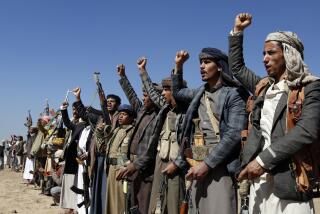Two Minds in Yemen About U.S. Ties
SANA, Yemen â When it comes to helping the United States in its war on terror, Yemen is behaving somewhat like a suspect who confesses only because there is a gun pointed at his head. That, at least, is the picture painted by one of the countryâs most influential leaders.
âWe have surrendered to the United States because it is the strongest in the world,â Abdullah Hussein Ahmar, speaker of parliament and head of the nationâs most powerful tribe, said in an interview Tuesday at his home.
This, in all probability, will not be the message conveyed directly to Vice President Dick Cheney when he makes a very brief appearance here today as part of his swing through the Middle East. Instead, he is likely to hear President Ali Abdullah Saleh repeat his firm and unconditional support for the war on terrorism and his appreciation for Washingtonâs military assistance in the form of a small contingent of U.S. troops.
But if Cheney were to spend any length of time in this sliver of a nation at the foot of the Arabian Peninsula, he would pick up on a far more ambiguous attitude, one that recognizes the futility of opposing the worldâs only remaining superpower but is also deeply distrustful of Washingtonâs aims and objectives.
On the issue of Iraq, for instance, he would hear many people say there is no love for President Saddam Hussein, but there is great anger at the United States for continuing to bomb a sovereign Arab state while maintaining sanctions that are perceived to punish civilians, not the regime.
â65% of Yemenis welcome U.S.,â read a recent headline in the English-language Yemen Observer.
âPublic opposes U.S. presence,â read another recent headline in the English-language Yemen Times.
Both are correct, reflecting the split in the Yemeni psyche. Yemenis want the social, political and economic benefits that cooperation with America might bring, yet they would also like to see the United States brought to its knees for supporting Israel.
All of these attitudes became clear as Ahmar held court in the cavernous greeting room of his house here in the capital. As leader of the Hashid tribe and a revered political figure, he holds daily sessions during which Yemenis from around the country kneel before him and ask that he settle disputes between families or provide financial aid for medical treatment.
âYou should know,â he said, âArab countries, and the Islamic world, do really hate America for its unlimited support of Israel.â Later in the interview he variously described Yemen and America as âstrong friendsâ and the emerging alliance between the two countries as a ânecessary evil.â
Perhaps the best example of the mental contortions taking place here involves the pending arrival of U.S. troops, who will train Yemenâs military in anti-terror operations.
âWe will not accept any American military,â Ahmar said, waving his hand over his head while resting on a pile of cushions. An aide adjusted a blanket draped over his feet and knees. âWe do not welcome them, and we will not.â
Asked about the U.S. troops who are coming to do the training, and the troops already here to pave the way for the pending forces, he said: âThat is something different. They are trainers. They are experts.â
Experts who happen to be U.S. military? âYes, exactly,â said Ahmar, who also heads Islah, the Islamic political party that controls the second-largest bloc of seats in parliament and has close ties to the president.
When terrorists hit the United States on Sept. 11, Yemenâs government unequivocally condemned the attacks. But the countryâs rough and isolated terrain, and its traditional tribal structure, had made it a perfect haven for Al Qaeda operatives. Yemen had to choose, quickly, between becoming a target in the U.S. war on terror or a partner.
It chose the latter, perhaps mindful of what happened in 1990, when Yemen opposed the U.S.-led effort to liberate Kuwait from Iraq.
Just one year later, international financial aid to Yemen had dropped dramatically--with the U.S. alone cutting its support from $22 million to $3 million. Yemen, the poorest country on the Arabian Peninsula, couldnât afford to take that route again.
So the leadership said it would work with America. But even members of President Salehâs ruling party, the General Peopleâs Congress, recognize the fine line he must walk.
âIt would have been much better if what is taking place now took place 30 years ago before satellite dishes are showing what is happening,â said Sultan Barakani, leader of the GPCâs parliamentary caucus.
âWhat we are afraid of is that such Arab regimes will collapse one after the other,â he said, âand that the people will go against their leadership due to the stand of the United States [with Israel].â
It is this fear that has leaders such as Ahmar so ambivalent. âWhat is between us and the United States is friendship.â But when asked whether he welcomed Cheneyâs visit, he replied, âThe visitor who wants to visit, we cannot refuse it, whether we want him or not.â
More to Read
Sign up for Essential California
The most important California stories and recommendations in your inbox every morning.
You may occasionally receive promotional content from the Los Angeles Times.










